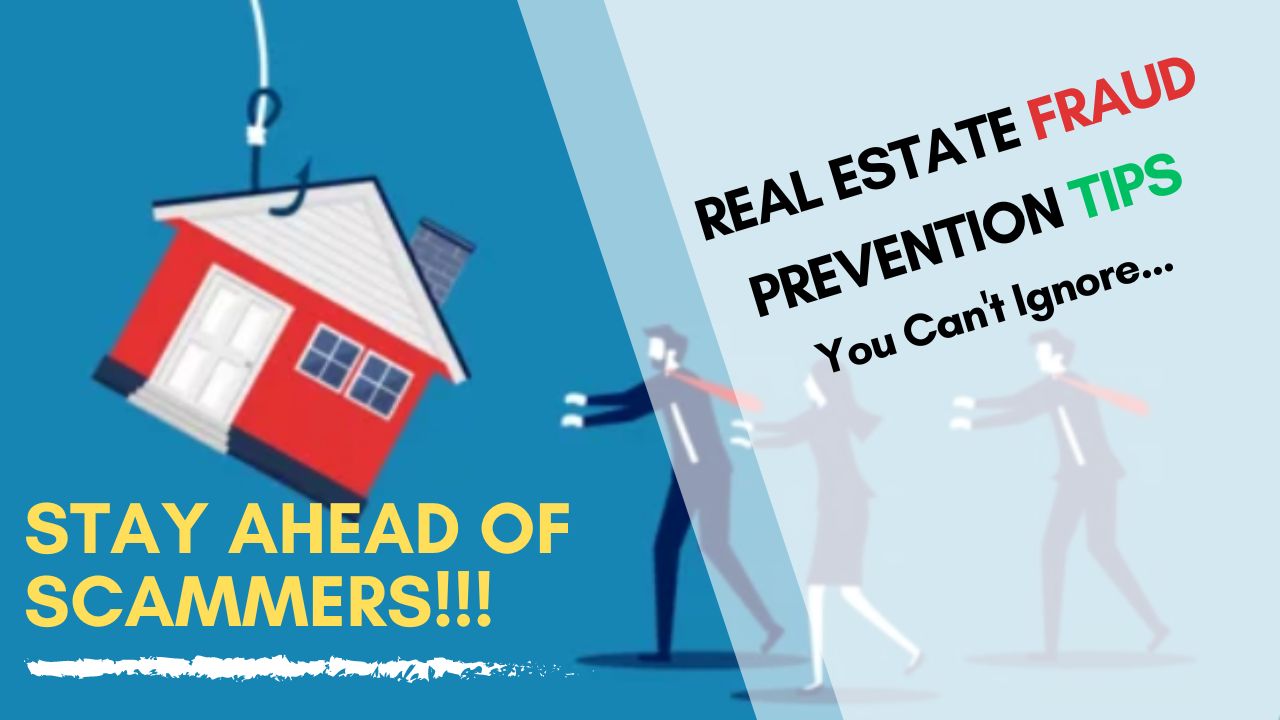Stay Ahead of Scammers!!! Real Estate Fraud Prevention Tips You Can’t Ignore

Real estate fraud is a growing concern, affecting both commercial and residential property transactions. Whether you’re buying, selling, or investing, understanding how to protect yourself from scams is crucial. Here are essential tips to help you stay ahead of scammers in both commercial and residential real estate markets.
Commercial Real Estate Fraud Prevention
Commercial real estate transactions often involve significant sums of money, making them prime targets for fraud. Here’s how you can safeguard your investments:
1. Verify Seller and Property Details
Tip: Always verify the authenticity of the seller and the property details. Fraudsters may create fake identities or misrepresent property details.
Action:
- Conduct background checks on sellers and their companies.
- Verify property details through official records and trusted commercial real estate databases.
2. Secure Financial Transactions
Tip: Ensure all financial transactions are conducted securely to avoid wire fraud and other financial scams.
Action:
- Use secure, verified banking channels for transactions.
- Double-check all wiring instructions through a known contact number before transferring funds.
3. Engage Professional Services
Tip: Work with trusted professionals such as commercial real estate brokers, lawyers, and financial advisors.
Action:
- Hire experienced professionals with strong reputations.
- Ensure that all agreements and transactions are reviewed by a legal expert.
4. Perform Thorough Due Diligence
Tip: Conduct comprehensive due diligence to uncover any hidden issues with the property or the seller.
Action:
- Review financial statements, lease agreements, and property records.
- Conduct environmental assessments and zoning checks.
Residential Real Estate Fraud Prevention
Residential properties are also vulnerable to various types of fraud. Here’s how to protect yourself in residential transactions:
1. Verify Listings and Agents
Tip: Ensure that property listings are legitimate and that real estate agents are properly licensed.
Action:
- Cross-check listings on multiple reputable websites.
- Verify agent licenses through official real estate regulatory bodies.
2. Protect Personal Information
Tip: Safeguard your personal and financial information from phishing and other scams.
Action:
- Avoid sharing sensitive information via email or phone unless verified.
- Use strong passwords and enable two-factor authentication for online accounts.
3. Recognize Common Red Flags
Tip: Be aware of common fraud indicators such as pressure to act quickly, unusually low prices, and requests for unusual payment methods.
Action:
- Take your time to verify details and consult with trusted professionals.
- Avoid deals that require untraceable payment methods like gift cards.
4. Conduct Title Searches and Inspections
Tip: Ensure the property is free of legal issues and in good condition.
Action:
- Hire a title company to perform a title search.
- Conduct a professional property inspection to identify any potential problems.
Common Fraud Schemes in Real Estate
Real estate fraud schemes can have devastating financial impacts. Awareness and understanding of these schemes are critical for prevention. Here are some of the most common fraud schemes in the real estate industry:
1. Wire Fraud
Description: Scammers intercept emails to provide fake wiring instructions, leading to funds being transferred to the fraudster’s account.
Prevention Tips:
- Always verify wiring instructions by calling a trusted contact using a known phone number.
- Use encrypted email services for sensitive communications.
- Confirm transactions in person or through a secure, known method.
2. Title Fraud
Description: Fraudsters forge property titles or illegally transfer ownership without the owner’s knowledge.
Prevention Tips:
- Regularly check your property title status with the local land registry office.
- Purchase title insurance to protect against potential title defects and fraudulent claims.
- Be cautious about sharing personal information and keep your documents secure.
3. Rental Scams
Description: Scammers list properties they don’t own, collecting deposits from tenants before disappearing.
Prevention Tips:
- Visit the property in person and meet the landlord or property manager.
- Avoid paying deposits or rent in cash or through untraceable methods.
- Verify the property owner’s details through public records.
4. Fake Listings
Description: Fraudsters create fake property listings to collect deposits for non-existent properties.
Prevention Tips:
- Cross-check property listings on multiple reputable real estate websites.
- Be wary of deals that seem too good to be true.
- Verify the existence and ownership of the property through public records or a real estate professional.
5. Loan Fraud
Description: Involves falsifying information on loan applications to secure mortgages.
Prevention Tips:
- Ensure all information provided on loan applications is accurate and truthful.
- Work with reputable lenders and financial institutions.
- Be wary of brokers or agents who suggest falsifying information to secure a loan.
6. Foreclosure Fraud
Description: Targets homeowners facing foreclosure with false promises of help, charging high fees without providing real assistance.
Prevention Tips:
- Be cautious of unsolicited offers to help with foreclosure.
- Work directly with your lender or a trusted financial advisor for foreclosure assistance.
- Avoid paying upfront fees for foreclosure help.
7. Bogus Real Estate Investments
Description: Scammers organize fake seminars, promising high returns with minimal risk to lure investors.
Prevention Tips:
- Research the organizers and speakers of any real estate seminar.
- Be skeptical of guarantees of high returns with little or no risk.
- Consult with a financial advisor before making any significant investments.
Conclusion
Understanding and recognizing these common real estate fraud schemes is the first step in protecting yourself and your investments. Always conduct thorough due diligence, work with reputable professionals, and be cautious with your personal and financial information.
PS: The information presented in this blog post was compiled from various publicly available sources and individual research. We do not claim ownership of this information but have endeavored to present it in an informative and engaging manner.
